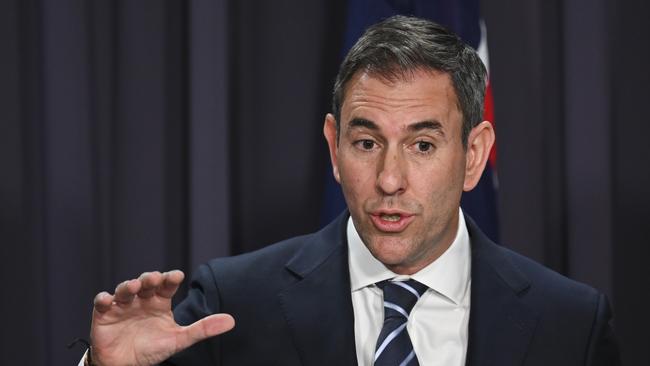‘Real snobbiness’: Jim Chalmers blasts criticism of taxpayer-funded jobs jump in care economy
Jim Chalmers has blasted Coalition criticism over the surging size of the public service and other taxpayer funded sectors, while also rejecting the Reserve Bank’s outlook that the economy is too strong.

Jim Chalmers has blasted the “real snobbiness” of criticism over the surging size of the public service and other taxpayer-funded sectors, while also rejecting the Reserve Bank’s outlook that the economy is too strong.
Speaking after the release of fresh data on Thursday which showed Australia’s remarkable run of jobs growth continued in September with 64,100 new positions created, threatening to further delay interest rate relief, the Treasurer defended the ballooning growth of the care economy.
“I completely reject this sense that it’s only a real job if it’s not in the care economy,” Dr Chalmers told ABC radio on Friday, arguing Labor wanted workers in the sector to be “respected”.
“There’s a real snobbiness at the core of that critique, which says that if you work in the care economy, that’s not a real job. It is a real job. We value it.”
Approximately two-thirds of the jobs created under the Albanese government have been in the so-called “non-market” sector, covering the public service, education and healthcare, despite accounting for just 17 per cent of the total economy.
Dr Chalmers’ comments came after opposition employment spokeswoman Michaelia Cash on Thursday accused Labor of increasing the size of the public sector at the expense of private sector job creation, claiming the growth in public sector roles was “not sustainable”.
Deutsche Bank chief economist Phil O’Donaghoe said the growth in public sector and non-market roles was likely “crowding out” activity in the private sector, which was struggling to attract workers.
“We know that the level of job vacancies in the private sector is way above (pre-pandemic) levels, so there’s still plenty of demand in the private sector,” he said.
The growth in the non-market sector, which has grown in recent decades and amounted to 82.2 per cent of the additional hours worked in the September quarter, also has profound implications for the nation’s already anaemic productivity growth, threatening to send it lower still.
There has been virtually no improvement in measured productivity growth in the care economy for 20 years, according to analysis by the e61 Institute, an independent think tank.
“Although productivity growth is difficult to measure in the care economy, a significant expansion in labour … has been essential to drive the growth of the care economy,” said Matt Maltman, a research economist at the institute.
With less-productive jobs in the care economy expected to grow further amid the rapid expansion of the NDIS, health and aged care, and other social programs, Challenger chief economist Jonathan Kearns said wages growth would “have to be lower” in the future to avoid adding to inflation.
In response to the strong jobs figures, investors moved to slash their rate cut bets, with markets now priced for a quarter point cut in April. Economists too warned that rate relief could be delayed, with some analysts stating there was a risk the central bank may be unable to reduce rates until the second half of 2025.
The tight jobs market has been highlighted by RBA governor Michele Bullock as among the several reasons for the central bank’s decision to effectively rule out cutting interest rates from 4.35 per cent until after Christmas.
Dr Chalmers, however, refuted the argument that the jobs market and the economy were too strong, claiming it was “hard to sustain that position” given national accounts data showed the economy expanded by a meagre 0.2 per cent in the June quarter.
“Growth in the economy is quite weak, and the labour market’s been softening a little too,” he said.
In its latest statement on monetary policy in August, the RBA assessed that aggregate demand was continuing to outstrip supply, indicating the economy was operating above a level consistent with inflation staying in the RBA’s 2 to 3 per cent target band.




To join the conversation, please log in. Don't have an account? Register
Join the conversation, you are commenting as Logout